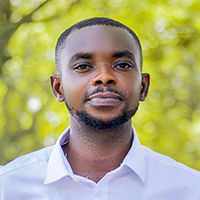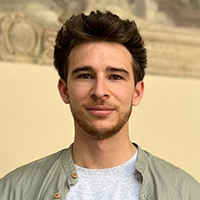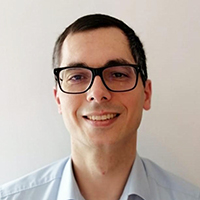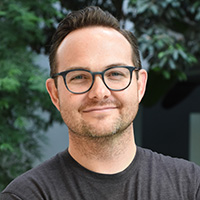New MembersZena SawagedOTSUKA  About: I am currently employed at OTSUKA, a neuroscience pharmaceutical company, and hold a Master’s in Global Affairs with a focus on International Law from NYU. My tenure at OTSUKA will conclude in August as I was not permanently placed. Interests: My interests lie in neuroethics, with a particular focus on mental illnesses such as paranoia, PTSD, schizophrenia, depression, and cognitive development. I have gained extensive social work experience from my roles at Housing Works, the NYC Mayor’s Office to End Domestic and Gender-Based Violence, and my current position at OTSUKA, where I ensure that patients with schizophrenia, major depressive disorder, PTSD, and bipolar disorder receive the necessary medical care. Seeking opportunties: I am seeking mentorship to integrate my interests in law and neuroscience professionally. My goal is to secure permanent employment while pursuing part-time legal education, with the aspiration of attaining a graduate degree in neuroscience concurrently. Abdullah YıldızAnkara University, Department of History of Medicine and Ethics, School of Medicine  About: I am currently an Assistant Professor at the Department of History of Medicine and Ethics at Ankara University School of Medicine, Turkey. My academic journey began with my graduation from Uludağ University Faculty of Medicine in 2007, followed by specialization in psychiatry at Gazi University in 2012. To broaden my academic horizon, I pursued additional degrees in sociology from Anadolu University in 2014 and philosophy from İstanbul University in 2023. In 2021, I completed my Ph.D. in History of Medicine and Ethics at Ankara University. After a clinical career, I transitioned to focus on academic research, particularly in the fields of bioethics and medical humanities, starting in 2015. Research focus: My aspiration is to conduct qualitative and phenomenological research in neuroethics. I am keen to learn new research approaches in the intersectionality of neuroscience and bioethics. Rishab JainHarvard College  About: I am a student at Harvard College and I'm interested in using machine learning to help advance our understanding of neural mechanisms behind human cognition along with the ethical consequences of such advancements. Research: Happy to collaborate on any projects or discussions in AI x neuroscience! Janelle YeoUniversity of Sydney, ANZAC Research Institute  About: I am an honours student in Neuroscience (University of Sydney, ANZAC Research Institute) with a background in neuroscience and anthropology (University of Sydney). Research: I have had first-hand experience in conducting neuroscience experiments in brain imaging (EEG), neuroenhancement (TMS), as well as biological models like iPSCs (motor neurons). And as an aspiring JD (University of New South Wales), I'm interested in exploring the ethical dimensions surrounding the application, interpretation, storage, and usage of neuroscience data. Lord Boateng AmponsahUniversity of Cape Coast  Research focus: I am a senior-year undergraduate student pursuing a bachelor's degree in biomedical sciences at the University of Cape Coast specializing in neuroscience. My research work currently focuses on exploring the neural basis for alcohol-induced learning and memory impairment in mice and using existing drugs as therapeutic options for treatment. I am interested in how brain data from the use of neuroimaging and neurotechnological tools are properly secured and protected. I aim to contribute to policies that regulate advances in neuroscience research in sub-Saharan Africa and also contribute to neuroethics education in Africa. Research Interests: Cognitive neuroscience, Computer Brain Interface, Neuroethics, Neurotechnology, Brain Data Privacy. Email: [email protected] / [email protected] LinkedIn / Twitter: @LordAmponsah_ Guido CassinadriSant'Anna School of Advanced Studies, Pisa  About: I am a PhD student in Health Science, Technology and Management at Sant'Anna School of Advanced Studies in Pisa and a PhD visiting student at the Technical University of Munich. I got a bachelor's and a master's degree in Philosophy at the University of Bologna. My research topics span through the philosophy of cognitive science, the philosophy of technology and neuroethics. In particular, my research in neuroethics tries to bridge the gap between the extended mind and cognition theory and the neurorights debate, by analyzing the ethical and normative implications of different ontologies of the mind. More generally, I am interested in the ethical implications of human-AI cognitive integrations. Research interests: Neurorights, Ethics of neurotechnologies, BCIs, Extended Cognition and Extended mind, AI-Mind integration, Cognitive Enhancement, Cognitive diminishment. I am open to collaborations on these topics. Orcid / University Profile / Research Page Florian RichterTechnical University Ingolstadt of Applied Sciences  My research focuses on the ethics of technology and artificial intelligence. I am a postdoctoral researcher at the Technical University Ingolstadt of Applied Sciences. Before that, I was a professor at the Tecnológico de Monterrey (Mexico). I taught classes on philosophy, ethics, and artificial intelligence. I studied philosophy, history, and politics at the University of Stuttgart (M.A.) and at the TU Darmstadt (Ph.D. in Philosophy) in Germany. I was also a Visiting Scholar at the University of Pittsburgh. I am open to collaboration and would like to learn more about empirical approaches in the field of neuroethics. Research interests: Ethics of technology, neuroethics, neurotechnology Lomax BoydJohns Hopkins University Berman Institute of Bioethics  My research focuses on scientific and ethical questions raised by human brain models that are created through genetic engineering, xenotransplantation, or in vitro brain organogenesis. Using scientific and conceptual approaches, I am interested in what are the neurobiological mechanisms that contribute to human cortical development and cognitive function, especially those that (may) contribute to our moral status. Moreover, I am particularly interested in how to integrate philosophical and empirical bioethics into neuroscientific research, training, and education. Research topics: Neuroethics education, community engagement, co-design Jagger WilcockArizona State University  I am a recent undergraduate alumnus with a bachelor of science in biological sciences, looking to pursue a career in neuroscience. In my time at Arizona State University, I was a member of the NeuroDevils club, and I got brief experience in the Memory and Attention Control Laboratory. Research Interests: BCI, Cognitive Enhancement, Crime and Punishment, Free Will, Genetics, Neurolaw, Neurorights |
